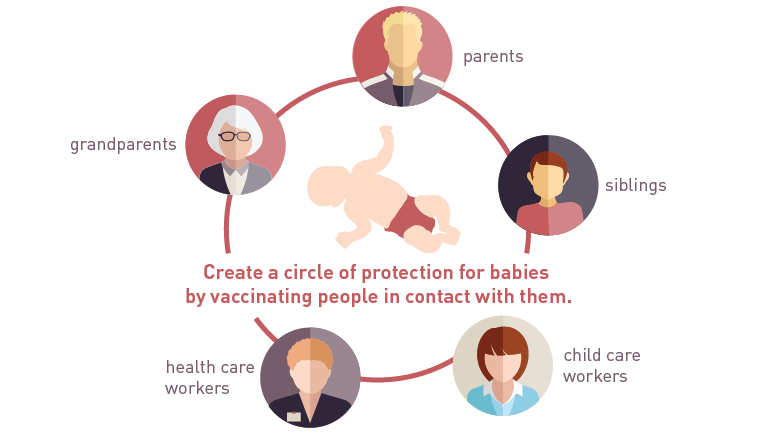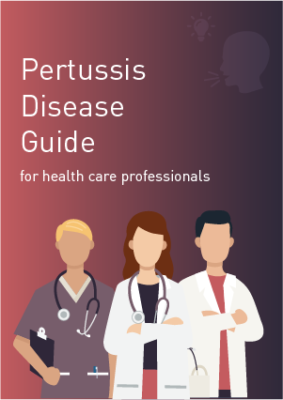About Pertussis
Pertussis (whooping cough) is a highly contagious bacterial infection affecting the respiratory system, and can cause severe illness and death. Children under 6 months of age who get whooping cough, usually require hospitalisation and are at greatest risk of severe disease and death.
A pertussis sufferer is infectious for up to 3 weeks. They infect an estimated 90% of unprotected and unvaccinated household contacts.1
As a health professional you play a critical role in the patient’s decision making. 73% of people would take your advice and have the pertussis vaccine.
Between 2008 and 2012, all Australian states experienced their largest pertussis epidemic. The highest rates of disease were in infants less than 6 months and children 5-9 years of age.2
Pertussis cases and deaths in children are currently at a record low number and have been controlled by universal vaccination.3 Physical distancing, travel restrictions, emphasis on hygiene, changes in testing priorities and diversion of resources to the COVID 19 pandemic are also likely to be reasons for the dramatic drop in reported pertussis cases over the last two and a half years.4
In 2020 there were 3,458 cases of pertussis reported nationally. Children under 15 years of age accounted for 40% of these notifications. In 2021, 564 cases were reported.5
1 Decker MD, Edwards KM. Pertussis (Whooping Cough). J Infect Dis. 2021 Sep 30;224(12 Suppl 2):S310-S320. doi: 10.1093/infdis/jiaa469. PMID: 34590129; PMCID: PMC8482022.
2 NCIRS, Pertussis Factsheet, https://www.ncirs.org.au/sites/default/files/2019-04/pertussis-fact-sheet_April%202019_Final.pdf, April 2019
3 Cherry JD, Doustmohammadi S. Pertussis vaccines. Curr Opin Pediatr. 2022 Apr 1;34(2):126-131. doi: 10.1097/MOP.0000000000001108. PMID: 35081553.
4 Bright A et al Commun Dis Intell (2018) 2020;44 (https://doi.org/10.33321/cdi.2020.44.85) Epub 5/11/2020
5 Department of Health, National Notifiable Diseases Surveillance System
Cause & Transmission
Pertussis (whooping cough) is an acute respiratory illness caused by the Bordetella pertussis bacterium.
Pertussis is highly contagious and only found in humans. It spreads by airborne droplets when an infected person sneezes or coughs. The droplets can be breathed in by others or passed on to others by touching a contaminated surface.
People with pertussis are most infectious in the first three weeks after the onset of symptoms.
Symptoms
Symptoms will start to appear 1–3 weeks after exposure to the bacteria. The disease begins like a cold, with a runny nose, mild fever and a cough.
The cough gets worse and can last 1–2 months or longer.
The illness is characteristically known for repeated violent bouts of coughing followed by a whooping inspiration.
The whoop may be absent in very young infants, older children and adults.
Some children cough so much they vomit afterwards.
Pertussis Complications
Severe complications, which occur almost exclusively in unvaccinated people, include pneumonia, hypoxic encephalopathy and death.
Some of the complications of whooping cough in young babies include:
- haemorrhage
- apnoea
- pneumonia
- inflammation of the brain
- convulsions
- permanent brain damage
- death
How is Pertussis Treated?
Pertussis is treated with an antibiotic usually azithromycin for 5 days, or trimethoprim-sulfamethoxazole for 7 days or clarithromycin for 7 days. These antibiotics will prevent the spread of pertussis to other people.6
If patients have been coughing for more than three weeks, they are rarely infectious. In these cases, antibiotics are usually not needed.
6 Therapeutic Guidelines Ltd (eTG March 2021 edition)
Who Should be Vaccinated?
Infants and children can receive a free pertussis vaccine under the National Immunisation Program (NIP).
Pertussis-containing vaccine** is recommended in a 5-dose schedule at 2*, 4, 6 and 18 months, and 4 years of age. A booster is recommended for 10-15 year olds (at school)
[*Infants can receive their first dose as early as 6 weeks of age.11]
Older children and teenagers can receive a free catch up vaccination now available through the NIP for individuals 10 to 19 years of age.
Humanitarian entrants and refugees aged 20 years and over can receive a free catch up vaccination now available through the NIP.
Adults – dTpa is recommended for any adult who wishes to reduce the likelihood of becoming ill with pertussis, but particularly important for special risk groups.
Special Risk Groups – pregnant women (free on NIP) and people in contact with infants (not funded under NIP for these individuals).
Booster dTpa Vaccinations
- People at 50 years of age, if their last dose was more than 10 years ago
- People 65 years and over who have not had whooping cough vaccine in past 10 years
- People travelling overseas if they haven’t had whooping cough vaccine within 10 years
**From 1st July 2023 hexavalent vaccine Vaxelis® was added to the NIP. Vaxelis® is used against diphtheria, tetanus, pertussis,hepatitis B, poliomyelitis and invasive infections caused by Haemophilus influenzae type b (DTPa-hepB-IPV-Hib) for children at 2, 4 and 6 months of age. Vaxelis® is now available as an alternative NIP-funded vaccine to Infanrix® hexa, and not as a replacement vaccine. There is no preferential recommendation between the use of these two products.
The preparation of Infanrix® hexa and Vaxelis® differs:
Infanrix® hexa vaccine consists of a single dose 0.5 mL pre-filled syringe and a vial containing a lyophilised pellet. The lyophilised pellet is the Hib component that needs to be reconstituted with the DTPa-hepB-IPV components (a liquid). It should be administered as a 0.5mL dose after reconstitution.
Vaxelis® vaccine is supplied as a single dose 0.5mL pre-filled syringe in a ready to use formulation containing all components.
Vaccine Effectiveness
A 3-dose primary series of immunisation with DTPa vaccine at 2 months, 4 and 6 months of age results in 84% protective efficiency against severe disease.7
Immunity to pertussis wanes over time. Effectiveness of 3 doses of DTPa vaccine declined progressively from 2 years of age to less than 50% by 4 years of age.8
A large trial in adolescents and adults demonstrated overall vaccine efficiency against confirmed pertussis of 92% within 2.5 years of vaccination.9
Vaccination Side Effects
Compared to whole-cell pertussis vaccines (DTPw), acellular pertussis vaccines are associated with a much lower incidence of:
- Fever (20% vs 45%)
- Local reactions (10% vs 40%)
Extensive limb swelling can occur with booster doses of DTPa. Such reactions commence within 48 hours of vaccination, last 1–7 days and resolve completely.10
Vaccination Co-Administration
Do not mix DTPa- or dTpa-containing vaccines with any other vaccine in the same syringe, unless specifically registered for use in this way.
Pertussis-containing vaccines can be co-administered with most other vaccines. Pertussis-containing vaccines can be co-administered with influenza vaccine to pregnant women.
Menactra may interfere with the immune response of some of the meningococcal serogroups if given with diphtheria containing vaccines, it is unknown if this interferes with clinical protection. If available, it is preferable to give Menveo or Nimenrix after a vaccine containing diphtheria toxoid.11
7 Zhang L, Prietsch SO, Axelsson I, Halperin SA. Acellular vaccines for preventing whooping cough in children. Cochrane Database of Systematic Reviews 2012;(3):CD001478
8 Quinn HE, Snelling TL, Macarthney KK, McIntyre PB. Duration of protection after first dose of acellular pertussis vaccine in infants. Pediatrics 2014;133;e513-9
9 Ward JI, Cherry JD, Chang SJ, et al. Efficacy of an acellular pertussis vaccine among adolescents and adults. New England Journal of Medicine 2005;353:1555-63
10 Rennels MB. Extensive swelling reactions occurring after booster doses of diphtheria-tetanus-acellular pertussis vaccines. Seminares in Pediatric Infectious Diseases 2003;14:196-8
11 Australian Technical Advisory Group on Immunisation (ATAGI). Australian Immunisation Handbook, Australian Government Department of Health, Canberra, 2018, https://immunisation handbook.health.gov.au
Pertussis Vaccination for Pregnant Women
Pertussis vaccine now funded for pregnant women under the NIP.
Studies show no increased risk of adverse pregnancy outcomes (such as stillbirth, foetal distress or low birth weight) related to pertussis vaccination during pregnancy.12
12 Munoz FM, Bond NH, Maccato M, et al. Safety and immunogenicity of tetanus diphtheria and acellular pertussis immunisation during pregnancy in mothers and infants: a randomised clinical trial. JAMA 2014;311:1760-9
Pertussis and Young Infants
Infants less than 6 months are at greatest risk of severe illness and death.

While the following adults may not receive a free pertussis vaccination under the NIP, to best protect infants against pertussis they should follow these recommendations:
- Adult household contacts and carers (e.g. fathers and grandparents of infants) should ideally receive a dTpa vaccine at least 2 weeks before beginning close contact with the infant.
- A booster vaccine is recommended for those who have not received one in the previous 10 years
- Adults working with infants and children under 4 should receive a dose of dTpa vaccine with a booster dose every ten years.
- All healthcare workers should receive a dose of dTpa with a booster dose every ten years.
Pertussis in Adults
53% of pertussis notifications in 2020 were adults 20 years and over.13
Patients and physicians may not be aware of the disease and diagnostic tests sometimes have limited sensitivity. Therefore, pertussis is likely to be under-diagnosed.
Pertussis can cause significant morbidity in adults, with a cough persisting for up to 3 months, and includes:
- Average of 10 work days lost
- Disruption to daily life
Adults (and adolescents) are a significant reservoir of infection.
Immunity acquired through vaccination or exposure to pertussis wanes and requires revaccination for protection.
dTpa is recommended for any adult who wishes to reduce the likelihood of becoming ill with pertussis.
Any adult who needs a tetanus-containing vaccine can have dTpa vaccine rather than dT, especially if they have not previously had a dTpa in adulthood.
13 Department of Health, National Notifiable Diseases Surveillance System

